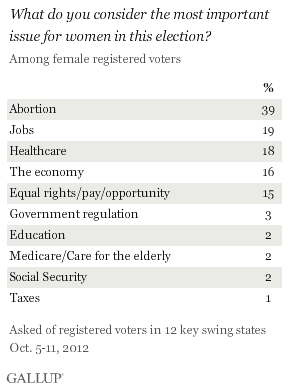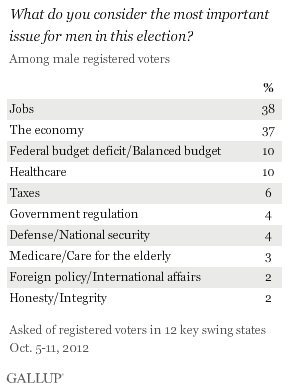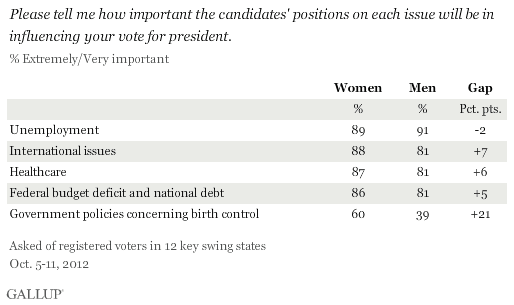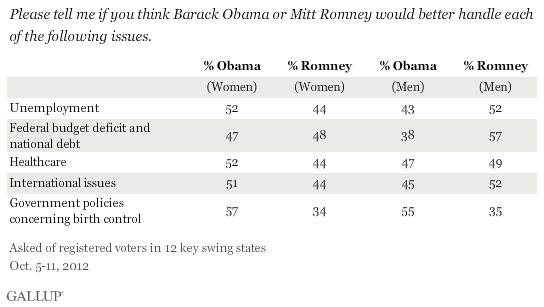WASHINGTON, D.C. -- Women in the 12 key swing states have starkly different responses from men when asked in an open-ended format to name the most important issues for their gender in the 2012 election. A plurality of female registered voters offered abortion (39%) as the most important issue for women, followed by jobs, healthcare, the economy, and equal rights. In contrast, men see jobs (38%) and the economy (37%) as the two most important issues facing men.


These results are based on an Oct. 5-11 USA Today/Gallup poll among registered voters in Colorado, Florida, Iowa, Michigan, Nevada, New Hampshire, New Mexico, North Carolina, Ohio, Pennsylvania, Virginia, and Wisconsin.
The survey was conducted prior to the second presidential debate held in Hempstead, N.Y., on Oct. 16.
Nationally, men and women largely agree with their swing-state counterparts in assessing each gender's most important issues for this election.
2012 Election Not Just About Economy
The vast majority of male voters in the swing states see economic and financial issues such as jobs, the economy, and the federal budget deficit as the most pressing matters for men. While all of these issues affect men, none are highly specific to men. On the other hand, while female voters in the swing states share concerns about jobs and the economy, they also mention two issues that are highly specific to women in their top five responses -- abortion and equal rights.
Several factors might explain this difference in election priorities among men and women. A March 2012 report issued by the National Bureau of Economic Research suggests that the economic consequences of the Great Recession fell harder on men, making economic growth and job creation especially vital priorities for them this year. Meanwhile, female voters' emphasis on abortion comes at a time when a number of states have approved new restrictions on the procedure. Several state legislatures, including such swing states as Florida and Virginia, passed 83 laws in 2011 restricting access to abortion services or increasing regulation on in-state abortion providers. These actions may have heightened concerns among some female voters.
The issues named by men as most important are the same types of general issues Americans nationwide mention when asked about the most important problem facing the country. As noted, this suggests that there are few specific "men's issues" in the current environment. The fact that women, on the other hand, mention in significant numbers certain issues that do not come up frequently among Americans overall -- abortion and gender equality -- shows that there are, in fact, specific women's issues.
Women More Likely to Prefer Obama on Key Issues
When asked to rate the importance of five specific issues, men and women voters in the swing states generally agree about the importance of each issue -- with the notable exception of government policies concerning birth control, which 60% of female voters believe to be an extremely or very important issue, compared with 39% of male voters.

Registered voters in the 12 swing states were also asked which candidate -- Barack Obama or Mitt Romney -- would better handle these issues. Women, in general, are more likely to support Obama in the presidential election than are men, making it not surprising that women are more likely than men to say that Obama would do a better job on each of the five issues.
The relative strength of Obama and Romney on each issue among both gender groups varies significantly. Obama does best among men and women on government policies concerning birth control. Romney does best among men and women on the federal budget deficit and national debt. On an absolute basis, Romney has a small advantage on the federal budget deficit and national debt among women. The only issue on which more male voters trust Obama over Romney is government policies concerning birth control, an issue that failed to register with men at all when they were asked in open-ended format as to what the most important election issues are for men.

Implications
These Gallup findings suggest that one cause for the gender gap in presidential preferences may be the fact that the two genders prioritize different issues. Both men and women are concerned with matters related to the economy and the federal budget deficit. But a significant percentage of female voters are concerned with social issues such as abortion and equality -- issues not mentioned by men, and issues that play to Obama's strengths.
Obama's advantage with women is thus partly predicated on these social issues. The size of the gender gap and its consequence to the 2012 election may rest in part on the Obama campaign's ability to emphasize these issues as especially critical to the female electorate. To attract more female supporters, Romney must continue to focus on his strengths on more general national issues, particularly the federal budget deficit and national debt, and continue to highlight their importance to women.
Track every angle of the presidential race on Gallup.com's Election 2012 page.
Survey Methods
Results for this USA Today/Gallup poll are based on telephone interviews conducted Oct. 5-11, 2012, on the Gallup Daily election tracking survey, with a random sample of 1,023 registered voters, aged 18 and older, living in Colorado, Florida, Iowa, Michigan, Nevada, New Hampshire, New Mexico, North Carolina, Ohio, Pennsylvania, Virginia, and Winsconsin, selected using random-digit-dial sampling.
The data represent a subset of the Gallup Daily election tracking survey for Oct. 5-11, 2012. For results based on the total sample of "swing state" registered voters, one can say with 95% confidence that the maximum margin of sampling error is ±4 percentage points.
Interviews are conducted with respondents on landline telephones and cellular phones, with interviews conducted in Spanish for respondents who are primarily Spanish-speaking. Each sample includes a minimum quota of 250 cell phone respondents and 250 landline respondents per 500 national adults, with additional minimum quotas among landline respondents by region. Landline telephone numbers are chosen at random among listed telephone numbers. Cell phone numbers are selected using random-digit-dial methods. Landline respondents are chosen at random within each household on the basis of which member had the most recent birthday.
Samples are weighted by gender, age, race, Hispanic ethnicity, education, region, adults in the household, population density, and phone status (cell phone only/landline only/both, cell phone mostly, and having an unlisted landline number). Demographic weighting targets are based on the March 2011 Current Population Survey figures for the aged 18 and older non-institutionalized U.S. population. All reported margins of sampling error include the computed design effects for weighting.
In addition to sampling error, question wording and practical difficulties in conducting surveys can introduce error or bias into the findings of public opinion polls.
For more details on Gallup's polling methodology, visit www.gallup.com.
